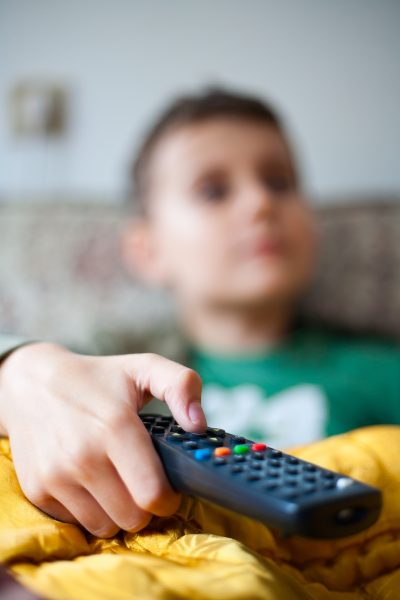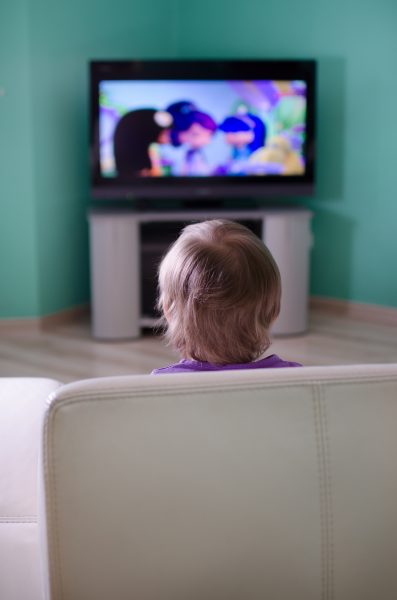Turning On The TV For Your Child? Do This First!
Inside: Five questions to evaluate your child’s screen time
How about you guys go turn on a movie?
Once again, 5:00 rolled around, I was just DONE for the day. Yet, there was much ahead of me still to be done and the children running around my feet were ready to make me snap.
Small ones willingly scampered off to zone out in front of their chosen show and I am finally met with peace, quiet, and …. conviction?
Sacrificing What’s Best for What’s Convenient
“It is, in fact, the parents for whom television is an irresistible narcotic, not through their own viewing (although frequently this, too, is the case) but at a remove, through their children, fanned out in front of the receiver, strangely quiet. Surely there can be no more insidious drug than the one that you must administer to others in order to achieve an effect for yourself.”
-Marie Winn, The Plug-In Drug
I had gotten into a rut.
Every day I was choosing to send my children away so I could clean up, make dinner, and have a little peace and quiet. And while there is nothing inherently wrong with needing a little quiet time, I was starting to see that choosing what was convenient for me was starting to have negative consequences in my children.
So, determined to make some changes, I started cutting back on screen time. However, I didn’t go about it without any thought. I found it very helpful to have some questions simmering in the back of my head.
These questions help guide my decisions and, maybe more importantly, they help me stick to my guns with the going gets tough.
Affiliate links included.
Evaluating Your Child’s Screen Time
If you, too, are looking to reevaluate your child’s screen time (or maybe even your own) I hope these five questions will be equally beneficial to you.
So, before you turn on that TV, ask these questions first.
1) What will my child be missing?
This question comes from one of the things I learned when reading the book, The Plug-In Drug by Marie Winn. The premise is, even if you set aside the studies that show the harm that screen time can cause, even if you view screen time as neutral or positive, there is still a problem.
The problem is this: when your child watches TV, he or she is likely missing out on something else that is better.
It might be helpful to think of it in terms of food…
Let’s say you eat pizza for dinner. Not necessarily the best or worst choice. Maybe it won’t effect your body too negatively. However, what could you have been eating for dinner instead? A salad? A balanced meal with a generous side of veggies?
Maybe skipping those healthy options for one meal doesn’t make too big of a difference, but what happens when you replace every dinner that week with pizza? Your body has missed out on a lot of important nutrients!
It is the same with screen time.
Maybe that 60 minutes of screen time in the afternoon doesn’t do much damage. However, when repeated day after day, week after week, what is my child missing out on while he zones out in front of the TV?
Over the course of a year, that 60 minutes of screen time a day, could have added up to:
50 hours of drawing
80 hours of exploring outside
70 hours of playing pretend
60 hours of helping in the kitchen
AND
100 hours of reading
It doesn’t take much convincing to see that those activities have so much more to offer to young bodies and minds than watching TV.
So, before I turn on the TV, I ask: “What is my child missing by spending time doing this?”
One of my personal biggest times for screen time weakness is while I am prepping dinner.
By that time of day, I am usually getting tired and ready for a break and my kids are getting antsy and more than a little wild. Turn on a show and problem is solved! However, this question convicted me. What were my kids missing during that TV time?
A lot, it turns out.
They were missing extra time outside to run, jump, play, explore, and burn off some of that energy.
They were missing time to use their imaginations to come up with new and fun games to play.
They were missing important bonding and learning time through helping me in the kitchen.
What they were missing ended up being much more important than the convenience of late afternoon screen time.
2) What is the Benefit?
After the previous section, you may be wondering, how could there be any?! But, whether you like it or not, technology and screens do have some benefits to offer.
When I turn on a screen to artforkidshub.com my son benefits from the drawing instruction he loves.
When I turn on a screen to a movie in Spanish, my English speaking kids get a little immersion into a language we desire to learn.
When I turn on a screen to an exercise video our bodies can be strengthened.
When I turn on a screen to a favorite movie, we all get to snuggle on the couch and laugh together.
There are benefits.
So, when you are evaluating the screen time in question, don’t forget to ask: “What are you good for anyway?”
3) What is the Purpose?
This goes along with the above in part, but I think it is still beneficial to ask. Why are you or your children reaching for screen time? What is the purpose here?
Is it to fix boredom? Is it purely for entertainment? Is it for education?
Once you ask, maybe you find your reason is not valid, but then again maybe it is!
Entertainment is not 100% bad either. I hope that my kids will grow to be the kind of people who CAN turn on a movie for entertainment, but who can also turn it off again when it is over.
But even more than that, I want my kids to use technology with purpose.
Screens aren’t going anywhere. As adults, they need to be able to navigate a technological world with direction. They need to know how to use the tools, instead of letting the tools control them.
One last comment on the purpose:
Sometimes the purpose of TV is to get a few moments of quiet to keep you from losing your mind or because you need something to keep your kids occupied for a bit so you can get something done.
Thats okay.
Sometimes I am honestly so grateful for the “babysitting” nature of screens. It can be a lifesaver in a pinch. The problem comes for me when it becomes a habit. Usually that means I need to take a step back and reevaluate what’s going on and possibly switch up the way we are doing things.
4) Will it Cause Harm?
There are three main ways I see screen time causing harm:
- The programming, in and of itself, is harmful.
- The time taken away from more beneficial activities is great enough to cause problems.
- The screen time is causing mental or physical difficulties in the child.
First, and probably most obviously, not all programming is created equal.
Whether it is highly inappropriate or just not something that reflects your values, there is a lot out there that is harmful to little eyes, minds, and souls. While that doesn’t mean all your child can ever use screens for is educational purposes, it is important to know where you and your family personally draw the line.
We covered the second point up in the first question, so that leaves number three. Yes, screen time can unfortunately cause some scary issues, both mentally and physically. I’m not going to get into them all in this post, but you can read more here, here, and here.
What I will say, though, is this: The effects that too much screen time have on my children, especially my preschooler, are obvious. And when that harm is glaring straight at me, it is very hard to justify any of my previously held reasons for flipping on a screen.
5) Is this a Season?
Finally, sometimes there are just seasons of more screen time. For me, I have learned that the most important thing is sometimes to just get through that season and then focus on forming new screen time habits.
There have been both long and short seasons in our home where we used more screen time, including:
- During stressful moves
- While working on big projects
- When a new baby is born
- During many days of bad weather
- While spending extended time the car
Knowing that these seasons are temporary helps me to make the decision that this is okay for now. Then, once we’ve made it through, we’ve always been able to cut back down on screens (although it’s not always easy) and get back to our normal way of doing things.
Because, though we may try to be perfect when it comes to screens and our kids, sometimes all we can do is try our best.
So now what?
Theres a good chance that if you are reading this, you may be recognizing that you need to make some changes to the way you do screen time with your kids. So, now the question is, “how do I go about it?”
That’ll be the topic I hope to tackle in my next post! Until then, take some time to ponder these five questions and evaluate your current screen time situation. Having a solid conviction behind your screen time rules is key to being able to consistently implement them!
You can also read THIS POST I wrote on tackling your own screen time habits.
And if you do have any screen time tips (for you or for your kids) I’d love to hear them! Please share them in the comments!




